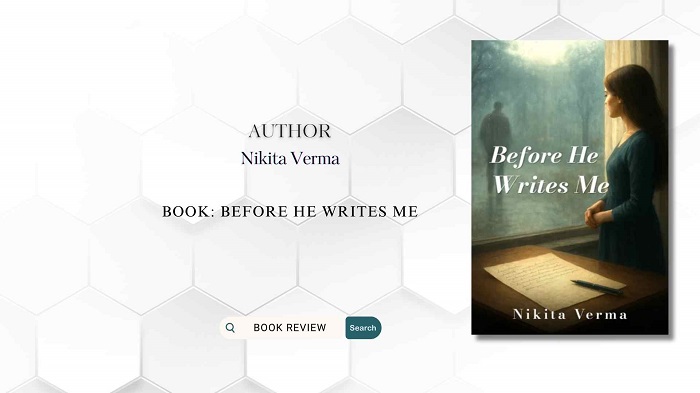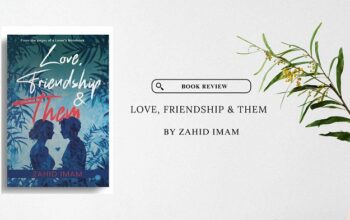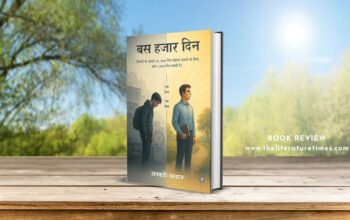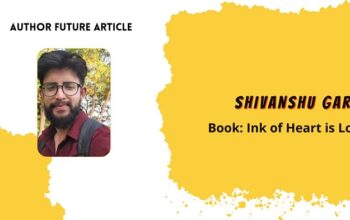Nikita Verma’s Before He Writes Me is not just a novel; it is a haunting love letter to time, memory, and the fragile beauty of human connection. In a world that often seeks logic and perfection, her story dares to remind us that love thrives in imperfection, in longing, and in the impossibility of forever. This time-travel romance bends the boundaries of what we know about fate, yet remains firmly rooted in the most universal of truths: that love, no matter how brief, has the power to alter everything.
The novel opens in the year 2125, in a future society where rules, logic, and the eradication of emotions dictate life. Aaravi Verma, the protagonist, belongs to this world where feelings are considered unnecessary, almost archaic. But when she stumbles upon an old, forgotten journal filled with the poetry of Vivaan Malhotra—a boy who lived a hundred years earlier and died too soon—her world cracks open. His words are filled with longing, love, and soul, something that Aaravi’s sterile world has lost. What begins as curiosity quickly turns into a quest, one that pushes her to break the very laws of her reality. With the journal as her guide, Aaravi decides to travel back to 2025, stepping into a world not her own and searching for the boy whose words made her feel alive.
From the very beginning, Nikita Verma ensures that Before He Writes Me doesn’t follow the predictable path of a love story. Instead, it is layered with dual perspectives, weaving Vivaan’s raw, poetic voice with Aaravi’s quiet, rebellious strength. Through this interplay, readers are taken on a journey where time becomes both enemy and ally, and where love exists in moments, even when permanence is impossible. The brilliance of the narrative lies in the way the poems breathe life into the story—they don’t just accompany the prose; they elevate it. Vivaan’s words become an echo of his soul, and when they begin to change to reflect Aaravi’s presence, the novel enters an uncharted territory of love and inevitability.
The romance between Aaravi and Vivaan is tender, hesitant, and achingly human. Their connection is less about grand declarations and more about the quiet, unforgettable details—the way Vivaan’s silences hold meaning, the way Aaravi’s gaze lingers a moment too long, the way their conversations seem to stitch two lifetimes together. The emotional intensity builds gradually, until it is impossible for the reader not to feel the weight of their love and the inevitability of their goodbye. Nikita does not shy away from heartbreak. She understands that the most unforgettable love stories are the ones that leave scars, and she delivers this truth with lyrical precision.
What makes Before He Writes Me especially poignant is its exploration of choice and consequence. Aaravi knows from the start that Vivaan’s fate is sealed, yet she dares to change time. Each decision alters the course of both their lives, and the journal itself begins to morph, creating new verses, new possibilities, new heartbreaks. This interplay between destiny and free will is the philosophical core of the novel, one that lingers with readers long after the final page.
Nikita Verma’s prose is both delicate and intense, moving effortlessly between poetry and narrative. There are passages that read like whispers, and others that strike like thunder. Her ability to balance lyrical beauty with emotional clarity sets her apart from many contemporary voices. The language is never ornamental for its own sake—it always serves the raw pulse of the story.
On a thematic level, the book grapples with the fragility of time, the inevitability of loss, and the courage it takes to love despite knowing its impermanence. It asks a daring question: If you had the chance to rewrite someone’s ending, would you? But the deeper question it leaves behind is more intimate: Even if love cannot last, is it still worth it? For Aaravi and Vivaan, and perhaps for all of us, the answer lies in the way love transforms us—even when it cannot save us.
Before He Writes Me is a novel for readers who believe in the poetry of love stories, in the ache of memory, and in the quiet power of words that outlive their writers. It is reminiscent of works that blend romance with metaphysical longing, yet it has a voice uniquely its own—youthful yet wise, fragile yet enduring. For fans of emotional fiction that lingers long after the book is closed, this is an experience worth surrendering to.
Nikita Verma, at just 21, has managed to write a book that feels timeless in its reach. By blending time travel with raw emotional truth, she has created a story that not only entertains but also unsettles in the best way possible. Before He Writes Me is more than a novel—it is an experience of falling in love with words, with characters, and with the impossible beauty of what it means to feel. It leaves readers with that bittersweet ache of having lived something precious, fleeting, and unforgettable. And perhaps, that is exactly what Nikita intended: to be felt, long after the last word.



